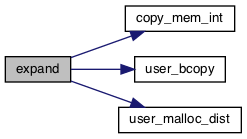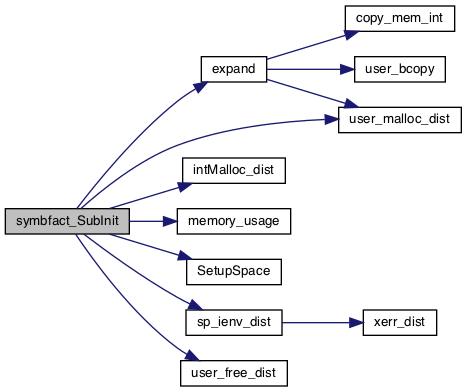Memory utilities. More...
#include "superlu_ddefs.h"
Include dependency graph for memory.c:

Variables | |
| SuperLU_ExpHeader * | expanders |
| SuperLU_LU_stack_t | stack |
| int_t | no_expand |
| long int | superlu_malloc_total = 0 |
Detailed Description
Memory utilities.
Copyright (c) 2003, The Regents of the University of California, through Lawrence Berkeley National Laboratory (subject to receipt of any required approvals from U.S. Dept. of Energy)
All rights reserved.
The source code is distributed under BSD license, see the file License.txt at the top-level directory.
-- Distributed SuperLU routine (version 5.2) -- Lawrence Berkeley National Lab, Univ. of California Berkeley. September 1, 1999 Modified: September 30, 2017, add aligned malloc for Intel
Function Documentation
◆ copy_mem_int()
|
static |
Here is the caller graph for this function:

◆ expand()
|
static |
Expand the existing storage to accommodate more fill-ins.
Here is the call graph for this function:

Here is the caller graph for this function:

◆ int32Calloc_dist()
| int * int32Calloc_dist | ( | int | n | ) |
◆ int32Malloc_dist()
| int * int32Malloc_dist | ( | int | n | ) |
◆ intCalloc_dist()
◆ intMalloc_dist()
◆ memory_usage()
Here is the caller graph for this function:

◆ QuerySpace_dist()
| int_t QuerySpace_dist | ( | int_t | n, |
| int_t | lsub_size, | ||
| Glu_freeable_t * | Glu_freeable, | ||
| superlu_dist_mem_usage_t * | mem_usage | ||
| ) |
mem_usage consists of the following fields:
- for_lu (float) The amount of space used in bytes for the L\U data structures.
- total (float) The amount of space needed in bytes to perform factorization.
- expansions (int) Number of memory expansions during the LU factorization.
◆ SetupSpace()
| void SetupSpace | ( | void * | work, |
| int_t | lwork, | ||
| LU_space_t * | MemModel | ||
| ) |
Setup the memory model to be used for factorization. lwork = 0: use system malloc; lwork > 0: use user-supplied work[] space.
◆ superlu_abort_and_exit_dist()
| void superlu_abort_and_exit_dist | ( | char * | msg | ) |
◆ superlu_free_dist()
| void superlu_free_dist | ( | void * | addr | ) |
◆ superlu_malloc_dist()
| void * superlu_malloc_dist | ( | size_t | size | ) |
◆ symbfact_SubFree()
| int_t symbfact_SubFree | ( | Glu_freeable_t * | Glu_freeable | ) |
Deallocate storage of the data structures common to symbolic factorization routines.
◆ symbfact_SubInit()
| int_t symbfact_SubInit | ( | superlu_dist_options_t * | options, |
| fact_t | fact, | ||
| void * | work, | ||
| int_t | lwork, | ||
| int_t | m, | ||
| int_t | n, | ||
| int_t | annz, | ||
| Glu_persist_t * | Glu_persist, | ||
| Glu_freeable_t * | Glu_freeable | ||
| ) |
Allocate storage for the data structures common to symbolic factorization
routines. For those unpredictable size, make a guess as FILL * nnz(A).
Return value:
If lwork = -1, return the estimated amount of space required, plus n;
otherwise, return the amount of space actually allocated when
memory allocation failure occurred.
Here is the call graph for this function:

◆ symbfact_SubXpand()
| int_t symbfact_SubXpand | ( | int_t | n, |
| int_t | jcol, | ||
| int_t | next, | ||
| MemType | mem_type, | ||
| int_t * | maxlen, | ||
| Glu_freeable_t * | Glu_freeable | ||
| ) |
Expand the data structures for L and U during the factorization.
Return value: 0 - successful return
> 0 - number of bytes allocated when run out of space
Here is the call graph for this function:

◆ user_bcopy()
|
static |
Here is the caller graph for this function:

◆ user_free_dist()
◆ user_malloc_dist()
Variable Documentation
◆ expanders
| SuperLU_ExpHeader* expanders |
◆ no_expand
| int_t no_expand |
◆ stack
| SuperLU_LU_stack_t stack |
◆ superlu_malloc_total
| long int superlu_malloc_total = 0 |